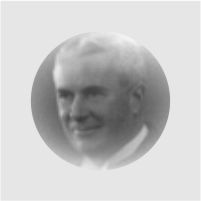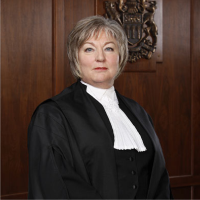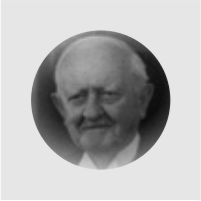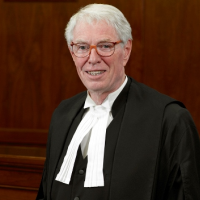Former Justices of the Court of Appeal
Court of Appeal | SaskatchewanCourts of Saskatchewan
Former Justices
Court of Appeal
Choose a category below to be taken to the specific section.
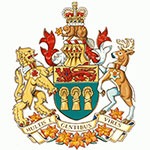
Former Chief Justices of the Northwest Territories
The Honorable Thomas H. McGuire
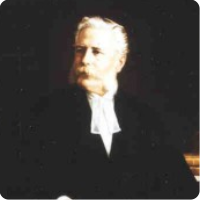
Thomas Horace McGuire was born in Kingston, Ontario on April 21, 1849. He received his education from Queen’s University and was admitted to the Ontario bar in 1875. McGuire practiced law and served as an alderman in Kingston, Ontario. He also became the editor of the Kingston Daily News and Canadian Freeman.
In 1887 he left the St. Lawrence River, and what promised to be a lucrative career, for the spirit of adventure and the banks of the North Saskatchewan River to accept an appointment to the Supreme Court of the Northwest Territories (salaries of the prairie judges were then $4,000 per annum).
The Yukon grew quickly with settlers seeking their fortunes in gold and in 1897 the Ottawa Government found it necessary to establish the judicial machinery known as the Territorial Court of the Yukon Territory in the Yukon Judicial District. It was to that district that McGuire was assigned. In 1898 he returned to Saskatchewan and in 1902 he was appointed the first Chief Justice of the Supreme Court of the North-West Territories. The appointment was given to McGuire even though Hugh Richardson had seniority. This promotion created an uncomfortable situation on the bench and less than a year later McGuire resigned.
The Honorable Arthur L. Sifton
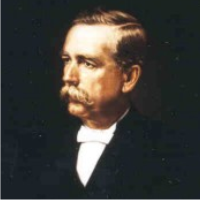
Charles Rouleau was born in Isle Verte, Quebec, on December 13, 1840. He received his education at Université Laval and was admitted to the Quebec Bar in 1868.
He was appointed a District Magistrate in the district of Ottawa in 1876 and a Stipendiary Magistrate and a member of the Executive Council for the North-West Territories on September 28, 1883. Rouleau was a member of the Board of Education of the North-West Territories from 1885 to 1893.
In 1887, Rouleau was appointed to the Supreme Court of the North-West Territories in the jurisdiction of Northern Alberta, Calgary, a position he held until his death on August 25, 1901
Former Justices of the Supreme Court of the Northwest Territories
The Honourable Hugh Richardson
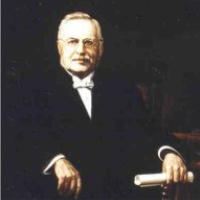
Hugh Richardson was born in London, Ontario on July 21, 1826. He received his education at Osgoode Hall in Toronto and was admitted to the Ontario bar in 1847.
In 1876 he was sent to the North-West Territories to act as a Stipendiary Magistrate (pursuant to the North-West Territories Act of 1875 a barrister with five years experience could preside as a part-time judge) and legal advisor to the newly appointed Lieutenant-Governor.
Hugh Richardson, as Stipendiary Magistrate, presided over the trial of Louis Riel in 1885.
In 1887 the Supreme Court of the North-West Territories was established and he was one of five puisne judges appointed to that Court. He presided in the jurisdiction of Western Assiniboia, Regina, until his retirement in 1903. The Honourable Hugh Richardson died 10 years later in 1913.
The Honourable James F. Macleod
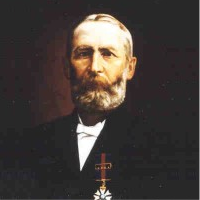
James Macleod, after graduating from Queen’s University, became a member of the Ontario Bar.
Macleod served as Lieutenant-Colonel from 1876-1887. He served during the Red River Resistance and afterward at Fort Garry. He was also appointed a Stipendiary Magistrate in 1876.
In 1887 Macleod was appointed to the Supreme Court of the North-West Territories where he served for seven years in the jurisdiction of Southern Alberta, Fort Macleod. Macleod was more colonel than judge. He had little interest in legal niceties and used an inborn pragmatism to bring men together to resolve disputes.
The Honourable James Prendergast
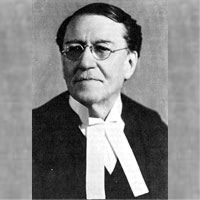
1906 – 1910 Justice of the Supreme Court of Saskatchewan
James Emile Pierre Prendergast was born in Quebec City on March 22, 1858 and was educated at Laval University. In 1882 he moved to Manitoba. He was a member of the Manitoba legislature from 1885 to 1896 and served as mayor of St. Boniface from 1893 to 1896.
From 1897 to 1902, . Prendergast was a Judge of the County Court for Manitoba. Then from 1902 to 1906 he served as a Judge on the Supreme Court of the North-West Territories. From 1906 to 1910, he served as a Judge on the Supreme Court of Saskatchewan. He was appointed to the Manitoba Court of King’s Bench in 1910.
Prendergast became Chief Justice of the Manitoba Court of Appeal in December, 1929 and retired in 1944. He had a remarkable judicial record, serving for forty-seven years on the bench in six different positions. He died in 1945.
*Some of this information is from Substantial Justice: Law and Lawyers in Manitoba 1670-1970, written by Dale and Lee Gibson (Winnipeg: Peguis Publishers, 1972). The photograph of Justice Prendergast is from the same publication.
The Honourable Charles B. Rouleau

Charles Rouleau was born in Isle Verte, Quebec, on December 13, 1840. He received his education at Université Laval and was admitted to the Quebec Bar in 1868.
He was appointed a District Magistrate in the district of Ottawa in 1876 and a Stipendiary Magistrate and a member of the Executive Council for the North-West Territories on September 28, 1883. Rouleau was a member of the Board of Education of the North-West Territories from 1885 to 1893.
In 1887, Rouleau was appointed to the Supreme Court of the North-West Territories in the jurisdiction of Northern Alberta, Calgary, a position he held until his death on August 25, 1901
The Honourable David L. Scott
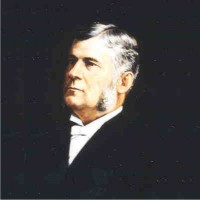
David Lynch Scott was born in Brampton, Ontario on August 21, 1845. He was educated at Brampton Grammar School and called to the Ontario Bar in 1870. He practised law in Orangeville until 1882. He also served as mayor of Orangeville from 1879-1880.
In 1882 he moved to Regina, North-West Territories. He practised law with W.C. Hamilton and was one of the Crown’s representatives who prosecuted Louis Riel.
In 1883 Scott married Mary McVittie of Barrie, Ontario and in 1884 he was elected by acclamation the first Mayor of Regina.
In 1894 he was elevated to the bench and served on the Supreme Court of the North-West Territories. In 1907, when the Saskatchewan and Alberta Courts were constituted, he was appointed to the Supreme Court of Alberta.
Former Justices of the Supreme Court of Saskatchewan
The Honourable Thomas Cooke Johnstone
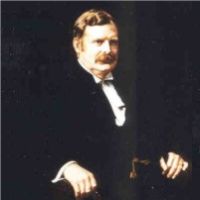
Thomas Cooke Johnstone was born in Brant County, Ontario in 1850. He moved to Regina in 1882 to set up his law practice. He became known as one of the best authorities on criminal practice in the West. He was one of several counsel representing Louis Riel at his trial in 1885. For many years he was Crown prosecutor for the judicial district of Assiniboia.
In 1906 he was appointed to the bench as a puisne judge of Western Assiniboia. One year later he was appointed to the Supreme Court of Saskatchewan together with Wetmore C.J.S., Newlands, Lamont and Prendergast JJ. The standard rate of pay at that time for a Supreme Court justice was $6,000.00 per annum.
Johnstone remained on the bench until illness forced his retirement in 1914. He died in Los Angeles, in his retirement home, three years later.
The Honourable James T. Brown
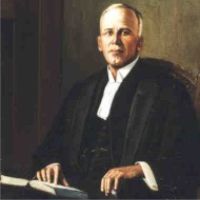
1918 – 1957 Chief Justice of the Court of King’s Bench for Saskatchewan
James T. Brown was born in Huntington, Quebec in 1871. He graduated with honours from McGill University in 1893. He was admitted to the Manitoba Bar in 1896 and then moved to Moosomin (one of the most active judicial centres in the Province at that time) to establish the well-known, successful firm of Brown, Wylie and Mundell.
In 1910 he was appointed to the Supreme Court of Saskatchewan and in 1918, when the Saskatchewan Courts were reorganized to establish an Appeal Court and a King’s Bench Court, he was appointed the Chief Justice of the Court of King’s Bench where he presided for thirty-nine years.
Brown served on the Regina Riot Inquiry Commission (1935-1936), the Royal Grain Inquiry Commission (1928-1931) and the Brown-Elwood Royal Commission (1916).
Brown died on April 29, 1957.
Former Chief Justices of Saskatchewan
The Honourable Edward L. Wetmore
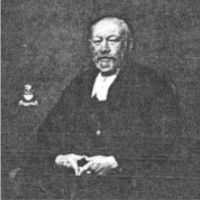
1907 – 1912 First Chief Justice of Saskatchewan
Edward L. Wetmore was born in 1841 in Fredericton, New Brunswick. He was educated at the University of New Brunswick and was admitted to the New Brunswick bar in 1864. He served as mayor of Fredericton for two years.
Wetmore was appointed a puisne judge of the first Supreme Court of the North-West Territories in 1887, in the judicial district of Eastern Assiniboia and settled in Moosomin. Wetmore placed a particular emphasis on courtroom decorum, and his interest in civil procedure helped shape the administration of justice in the West. He was known for his punctuality, even though he undertook his duties at a time when travel was often by scow or canoe.
When the Court was reorganized in 1907 to become the Supreme Court of Saskatchewan, Wetmore was appointed the first Chief Justice of Saskatchewan. In 1909 he became the first Chancellor of the University of Saskatchewan. He served as Chief Justice until 1912.
The Honourable Edward L. Wetmore passed away in 1922.
Regina’s Wetmore Elementary School on Wallace Street was named in commemoration of the Honourable Edward L. Wetmore. The school closed in 1997 and was replaced with Wetmore Court Housing Development.
The Honourable William F.A. Turgeon
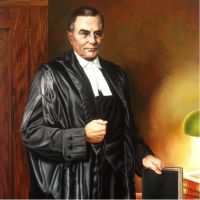
1938 – 1941 Chief Justice of Saskatchewan
William F.A. Turgeon was born in 1877 in Petit-Rocher, New Brunswick, and was raised in New York. In 1893 he attended the Collège de Lévis in Quebec, and in 1900 he received a Bachelor of Arts degree from Laval University. He apprenticed with a law firm in Saint John and was called to the New Brunswick bar in 1902.
. Turgeon was drawn to Prince Albert, Saskatchewan, because of the prospects it held for a young, bilingual lawyer. At the time, Prince Albert was the judicial centre for the North-West Territories. He moved there in 1903 and founded a law practice. He served as a crown prosecutor and also as Prince Albert’s first city solicitor until he entered politics. At the age of 30, he became Saskatchewan’s second Attorney General. He served as Attorney General from 1907 until 1921.
In 1921, Turgeon was appointed to the Court of Appeal, and in 1938 he was appointed Chief Justice of Saskatchewan. He served as Chief Justice until 1941, when Prime Minister King asked him to resign from the Court of Appeal and take up a challenging diplomatic post in Buenos Aires, Argentina. He went on to have a distinguished diplomatic career, serving as the first Canadian ambassador to Chile and as Canadian ambassador to five other countries.
The Honourable William F.A. Turgeon served on 12 federal and provincial Royal Commissions and was a recipient of the Order of Canada. He passed away on January 11, 1969. Shortly after his death, W.F.A. Turgeon School in Prince Albert was named in his honour.
The Honourable Emmett M. Hall
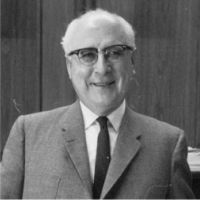
1961 – 1962 Chief Justice of Saskatchewan
1962 – 1973 Justice of the Supreme Court of Canada
Emmett M. Hall was born in 1898 in Saint-Columban, Quebec. His family relocated to Saskatoon in 1910. Fluent in French and English, Hall taught elementary school in northern Saskatchewan before attending law school at the University of Saskatchewan. He graduated in 1919 and was called to the Saskatchewan bar three years later.
Hall spent the next 35 years in private practice. In 1935 he was appointed King’s Counsel. He handled a number of high profile cases, such as matters arising from the Regina riots. From 1948 to 1958, he lectured at the College of Law at the University of Saskatchewan. In 1952 he became president of the Law Society of Saskatchewan.
Hall was appointed Chief Justice of the Court of Queen’s Bench in 1957. In 1961 he was appointed Chief Justice of Saskatchewan. Less than two years later, he was appointed to the Supreme Court of Canada.
Hall served on the Supreme Court until 1973. From 1980 to 1986 he served as Chancellor of the University of Saskatchewan.
He was known for the large number of Royal Commissions and other public inquiries over which he presided. This included being the Chairman of the Royal Commission on Health Services, which recommended the creation of a universal health care system for Canada. As a result of his work on the Commission, he is widely regarded as a founding father of medicare.
The Honourable Emmet M. Hall passed away on November 12, 1995.
The Honourable Edward D. Bayda
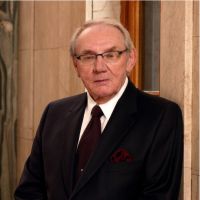
1974 – 1981 Justice of the Court of Appeal for Saskatchewan
1981 – 2006 Chief Justice of Saskatchewan
Edward D. Bayda was born in 1931 in Alvena, Saskatchewan. After completing his high school education in Saskatoon, he attended the University of Saskatchewan and obtained a Bachelor of Arts degree in 1951 and a Bachelor of Law degree in 1953. He was admitted to the Saskatchewan bar in 1954.
Bayda was in private practice for 18 years, practicing primarily as litigation counsel. He was appointed Queen’s Counsel in 1966.
In 1972 he was appointed to the Court of Queen’s Bench for Saskatchewan, and in 1974 he was appointed to the Court of Appeal for Saskatchewan. From 1974 to 1975, he served as the Commissioner for the Vancouver Port Grain Handling Industrial Inquiry. Bayda also served as Chairman of the Cluff Lake Board of Inquiry from 1977 to 1978.
In 1981, Bayda was appointed Chief Justice of Saskatchewan. He served in this position for 25 years, retiring in 2006. He received honourary law degrees from the University of Saskatchewan in 1989 and the University of Regina in 2006. After retiring from the bench, he took on the role of senior advisory counsel with a Regina law firm.
The Honourable Edward D. Bayda passed away on April 2, 2010.
The Honourable Robert G. Richards

2013 – 2023 Chief Justice of Saskatchewan
The Honourable Robert G. Richards was appointed to the Court of Appeal in 2004 and named Chief Justice of Saskatchewan in 2013.
He received a B.Comm (1975) and LL.B. (1979) from the University of Saskatchewan and an LL.M. (1982) from Harvard Law School. Richards served as a law clerk to Justice Martland of the Supreme Court of Canada (1979-80) and as a Parliamentary Intern in the House of Commons (1980-81). He was an associate lawyer with Gowling and Henderson in Ottawa (1982-84) and Director of Constitutional Law with the Saskatchewan Department of Justice (1985-90).
He then joined MacPherson Leslie and Tyerman in Regina. As a lawyer, he maintained a litigation practice with an emphasis on public law and appellate matters, and was counsel in over 40 Supreme Court of Canada appeals. Richards held numerous leadership positions in the legal community including Chair of the Supreme Court of Canada – Canadian Bar Association Liaison Committee and Co-Chair of the National Canadian Bar Association Constitutional and Human Rights Law Section. He was a frequent, long-time lecturer at the College of Law, University of Saskatchewan, and at the Bar Admission Course. He remained active after his appointment, holding positions including First Vice Chair of the Canadian Judicial Council and chair of the CJC’s salary and benefits committee.
The Honourable Robert G. Richards retired in 2023.
The Honourable Frederick W.G. Haultain
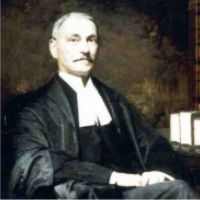
Frederick W.G. Haultain was born in 1857 near Woolwich, England. His family immigrated to Canada in 1860. He attended the University of Toronto and was called to the Ontario bar in 1882.
Haultain practised law in Fort Macleod, in what was then the North-West Territories. He became active in politics, and in 1888 he was elected to the Territorial Assembly. In 1897 he became the first premier of the North-West Territories. In Saskatchewan’s first provincial election in 1905, he led the opposition Provincial Rights Party, which sought greater provincial control over land, resources and development.
In 1912 he retired from politics and was appointed Saskatchewan’s second Chief Justice. He retained this position when the court system was reorganized in 1918 to provide for a trial court and a separate appeal court. Haultain was knighted in 1916. He served as the Chancellor of the University of Saskatchewan from 1917 until 1939. He served as Chief Justice until 1938.
The Honourable Sir Frederick W.G. Haultain passed away on January 30, 1942. Chief Justice Martin said of him, “No judge in Western Canada was held in higher esteem by his brothers of the bench and the members of the bar.”
Haultain Elementary School, located on Edgar Street in Regina, was named after him. The school closed in 2015, making way for “Haultain Crossing”, a Habitat for Humanity development.
The Honourable William M. Martin
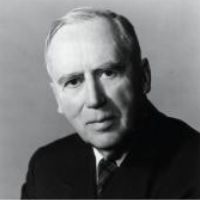
1941 – 1961 Chief Justice of Saskatchewan
William M. Martin was born in 1876 in Norwich, Ontario. He attended the University of Toronto, graduating in 1898 with an honours degree in classics. Martin then attended the Ontario School of Pedagogy, where he obtained a teacher’s certificate. After teaching for two years, he returned to the University of Toronto to study law.
In 1903, Martin moved to Regina and established a law practice with his cousin, James Balfour. In 1908, at the age of 32, he was elected Member of Parliament for the newly created riding of Regina. He served in this position until 1916, when he resigned his seat to enter provincial politics. He was elected to the Legislative Assembly in a by-election in 1916 and became the second premier of Saskatchewan. In addition to his duties as premier, he also served at times as Minister of Education and as Attorney General.
He served as premier until 1922, when he resigned to accept an appointment to the Court of Appeal. In 1941, Martin was appointed Chief Justice of Saskatchewan. He served in this position until 1961, when he was required to retire due to the passage of legislation stipulating that judges must retire at the age of 75.
During WWII, Chief Justice Martin served as custodian of Enemy Alien Property in Canada, and in 1949 he served as chairman of a commission assigned the task of revising the Criminal Code.
The Honourable William M. Martin passed away in 1969. Martin Collegiate in Regina was named in his honour.
The Honourable Edward M. Culliton
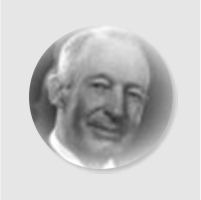
1962 – 1981 Chief Justice of Saskatchewan
Edward M. Culliton was born in 1906 in Grand Forks, Minnesota, but grew up on a farm near Elbow. He obtained a law degree from the University of Saskatchewan in 1928. He was admitted to the Saskatchewan bar in 1930 and established a law practice in Gravelbourg.
In 1935, Culliton was elected to the Legislative Assembly. Three years later, he was appointed Provincial Secretary.
Culliton resigned from the provincial cabinet to serve with the Canadian Army in 1941, but retained his seat in the Legislative Assembly as a minister without portfolio. In 1944, the Liberal administration was defeated. He returned to his law practice in Gravelbourg and in 1947 was appointed King’s Counsel. He was re-elected in the 1948 election.
In 1951, Culliton accepted an appointment to the Court of Appeal for Saskatchewan. In 1962 he was appointed Chief Justice, a position he held until 1981. He showed great leadership on the Court, was involved in the creation of the Canadian Judicial Council, and made notable contributions to the area of criminal law.
Chief Justice Culliton served as Chancellor of the University of Saskatchewan from 1962 to 1968. In 1981, he was named a companion of the Order of Canada.
Following his retirement, he issued the “Culliton Report”, which recommended the enactment of a comprehensive access and privacy law in Saskatchewan.
The Law Society of Saskatchewan established the “Chief Justice E.M. Culliton Scholarship” in 1981, which is awarded for post-graduate studies in criminal law.
The Honourable Edward M. Culliton passed away on March 14, 1991.
The Honourable John Klebuc
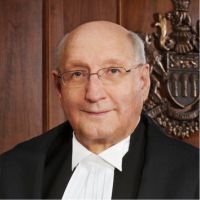
2006 – 2013 Chief Justice of Saskatchewan
2013 – 2015 Justice of the Court of Appeal for Saskatchewan
John Klebuc was born in 1940 in Meadow Lake, Saskatchewan. In 1964 he graduated from the University of Saskatchewan with a Bachelor of Arts degree and a Bachelor of Law degree. He was admitted to the Saskatchewan bar in 1965. He worked in private practice for 28 years, practicing in the areas of commercial and business law, commercial real estate, and resource law.
Klebuc was actively involved in legal education, the Canadian Bar Association, and served on the board of several non-profit organizations. He taught at the University of Regina and lectured at Law Society of Saskatchewan legal education seminars. He was appointed Queen’s Counsel in 1985.
In 1993 he was appointed to the Court of Queen’s Bench for Saskatchewan. He served in that role until 2006, when he was appointed Chief Justice of Saskatchewan.
As Chief Justice, he led the development of a comprehensive digital case management system known as eCourt. He also chaired the Canadian Judicial Council’s Judicial Computer Technology Sub-Committee.
In June 2013, he stepped down from the position of Chief Justice and served as a supernumerary judge until he retired from the bench in April 2015.
Former Justices of the Court of Appeal for Saskatchewan
The Honourable John H. Lamont

1918 – 1927 Justice of the Saskatchewan Court of Appeal
1927 – 1935 Justice of the Supreme Court of Canada
John Henderson Lamont was born to Scottish immigrants in Horning’s Mills, Canada West (Ontario) in 1865. In the 1890s, he earned his arts and law degrees at the University of Toronto and took further law studies at Osgoode Hall. He was called to the Ontario bar in 1893 and practiced law in Toronto for six years.
Lamont came west in 1899 and started a law practice in Prince Albert. The law practice flourished. Alphonse Turgeon, who later became provincial Attorney General and Chief Justice of the Court of Appeal, joined his firm. In 1904, Lamont was elected a Liberal MP for the Saskatchewan constituency of the Northwest Territories. When Saskatchewan was founded in 1905, he entered provincial politics and became the first Attorney General under Premier Walter Scott. As Attorney General, he faced the arduous task of creating the statutory framework for the Supreme Court, District Court System, and law enforcement via police magistrates.
Lamont was appointed to the provincial Supreme Court in 1907. In 1918, he became one of the judges of the newly formed Court of Appeal. He is credited with implementing the laws of the Torrens system.
In 1927, Lamont was appointed to the Supreme Court of Canada, being only the second judge on that Court to come from the Prairies. In 1935, he became unable to sit on the bench due to illness. He died on March 10, 1936, in Ottawa.
The Honourable Henry W. Newlands

1907 – 1918 Justice of the Supreme Court of Saskatchewan
1918 – 1921 Justice of the Saskatchewan Court of Appeal
Henry W. Newlands was born in 1862 in Dartmouth, Nova Scotia. He was admitted to the Nova Scotia Bar in 1883 and moved to Prince Albert in 1885. He practiced law in Prince Albert until 1897, when he was appointed Inspector of Land Titles Offices for the North-West Territories. This appointment required him to move to Regina. In 1897, Newlands also became a legal advisor to the Yukon Council in the days of the Gold Rush.
In January 1904, Newlands was appointed to the Supreme Court of the North-West Territories. In 1907, he was appointed to the Supreme Court of Saskatchewan. While a member of the Court, Newlands sat on the Royal Commission that looked into the consolidation of statutes and ordinances and on a public inquiry into certain school contracts.
He became a member of the Court of Appeal when it formed in 1918. He left the Court in 1921 to serve as Lieutenant-Governor of Saskatchewan. He served two successive terms, from 1921 to 1931. His later years were spent in Ontario, where he died in 1954.
The Honourable Phillip E. MacKenzie
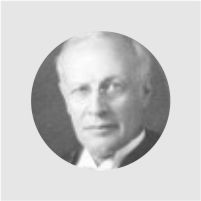
1927 – 1946 Justice of the Saskatchewan Court of Appeal
Phillip E. MacKenzie was born in London, Ontario, on January 9, 1872. He attended the University of Toronto and was admitted to the Ontario Bar in 1896. He practiced law in London, Ontario, and then in Kenora, Ontario. In 1902 he married Alice Stickland Vickers.
MacKenzie served as the Crown Attorney and Clerk of the Peace in Kenora from 1904 to 1910. In 1910, he entered into the law partnership of McCraney, Mackenzie, and Hutchison in Saskatoon. He was appointed to the Court of King’s Bench in 1921 and to the Court of Appeal in 1927. He served on the Court until June 19, 1946.
The Honourable Thomas Clayton Davis
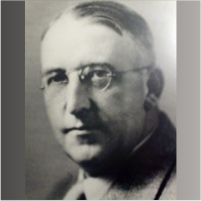
Thomas Clayton Davis came from an Irish family who initially settled just south of Sherbrooke, Quebec. His grandfather was a campaign organizer for Sir John A. Macdonald. His father moved from Quebec to Prince Albert, where he and a brother operated a general store and got involved in the freight business.
Thomas Davis earned his law degree from Osgoode Hall in 1909. He moved to Prince Albert to practice, becoming a partner with Frank Halliday. Davis served as Mayor of Prince Albert from 1921-1924. He was appointed Minister of Municipal Affairs in February 1926 and in December 1927, he became Attorney General. In the 1929 provincial election, Davis defeated John Diefenbaker in the Prince Albert riding by a small number of votes. After serving one term, he returned to private practice. In 1934, Premier James Gardiner reappointed him as Attorney General. Davis was a gifted politician. He had an incredible memory for names and paid close attention to the personal details of his constituents.
In June 1939, Davis was appointed to the Court of Appeal. His time on the Court of Appeal was brief. In 1940, Prime Minister Mackenzie King appointed him Deputy Minister of War Services. He then assumed the diplomatic roles of High Commissioner to Australia from 1942-1946 and Ambassador to China from 1946-1949. In 1948, Davis resigned his seat on the Court of Appeal and became a permanent member of the Foreign Service, serving as Ambassador to West Germany.
The Honourable Percival M. Anderson
1938 – 1946 Justice of the Saskatchewan Court of King’s Bench
1946 – 1948 Justice of the Saskatchewan Court of Appeal
Percival McCuaig Anderson was born on January 9, 1879 in Paisley, Ontario. He received his elementary education in Uxbridge, Ontario, and graduated from Belleville High School as the gold medallist. Anderson attended Queen’s University, earning his Honours in Political Science and History. He studied law with a Winnipeg law firm.
In 1909, Anderson relocated to Saskatchewan and worked at a firm in Regina. He married Edith Leslie in 1911, and the couple had two daughters. Anderson was a successful lawyer, appearing at least twice before the Privy Council in England. In 1919, he received the designation of King’s Counsel.
Anderson was president of the Regina Federal Liberal Association from 1925-1932. In June 1934, he was elected as an MLA for Regina and was re-elected in June 1938. During the Second World War, Anderson was appointed chairman of the war labor mobilization board for Saskatchewan.
He practiced law for 29 years before being appointed to the Court of King’s Bench in November of 1938. In 1946 he was appointed to the Court of Appeal. One evening in November of 1948, he returned home from a day at the Court and suddenly took ill. He died the next day.
An article in the November 22, 1948, issue of the Regina Leader-Post reads “The people of Regina and Saskatchewan will long remember Judge Anderson – not alone for his services to the province, great as those services were, nor for his undoubted ability as a lawyer and later as a justice on the bench – but for his own likeable self, his warm kindliness and his deep humanity.”
The Honourable Donald A. McNiven
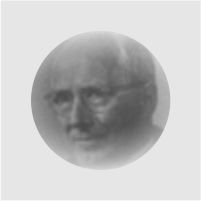
1949 – 1961 Justice of the Saskatchewan Court of Appeal
Donald McNiven was born in Walkerton, Ontario in 1887. His family relocated to Virden, Manitoba when he was an infant. He went to public school in Virden and then went on to study at the University of Manitoba. McNiven taught school for two years before reading law and articling to a firm in Virden. He completed his articles in Regina at the firm of Fish and Anderson. In 1912, he was called to the Saskatchewan bar, and in 1919 went into partnership with Douglas Fraser, K.C. Also in 1919, he married Leila Maud Higginbotham of Virden, and they had one daughter.
McNiven was involved in politics, presiding over the Regina Liberal Association for seven years. In 1922, he ran successfully as a Liberal candidate in the provincial election. He was re-elected as an MLA in 1925. He lost the subsequent 1929 election when the Conservatives gained a majority government. However, in 1935, McNiven was elected to the House of Commons representing Regina and was re-elected in 1940.
In 1944, McNiven resigned his seat in the House to accept an appointment to the Court of King’s Bench in Regina. Also in 1944, he served on the regional war board, the Saskatchewan Wartime Relations Board, and was alternate chairman of the National War Labor Board. He was appointed to the Saskatchewan Court of Appeal in 1949 and served on the Court until July of 1961. He died in August 1961.
The Honourable Mervyn J. Woods
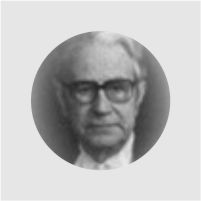
Mervyn J. Woods was born in Regina on June 8, 1909. He attended high school in Kincaid and Moose Jaw. In 1929 he attended Teachers’ College in Moose Jaw, receiving his diploma in 1929. From 1929 to 1934 he taught school in the Mossbank area.
Woods attended the University of Saskatchewan, graduating from the College of Law with distinction in 1937. Following that, he did post-graduate work at New York University and then went on to article with McKercher, McCool and Francis in Saskatoon. In 1939, he was called to active service in the Royal Canadian Navy. He went overseas in 1940, serving in the North Sea around Scotland and between Liverpool and Gibraltar. He returned to Halifax for shore duty in 1942, going back to sea in 1944 as a commanding officer of the H.M.C.S. Longueuil, where he served until the end of the war. He retired in 1945 with the rank of Lieutenant Commander.
After the war, he returned to Saskatoon and became partners with W.B. Francis and D.E. Gauley. During the 1950s, Woods was President of Saskatchewan’s Progressive Conservative Party. In 1956, he was invited to teach at the College of Law in Saskatoon and did so for five years. During that time he obtained his L.L.M. and doctorate in law. He was also very involved with the Royal Canadian Legion, holding the position of Dominion President and Provincial President. Woods also served as the Lieutenant Governor of the Kiwanis Club.
In 1961, Woods was appointed to the Court of Appeal. While a sitting justice of the Court, he organized a Royal Commission on Veteran’s Affairs and chaired the Royal Commission on Medicare for Saskatchewan. The Commission’s final report became known as the “Woods Report.”
Woods retired in 1984. In 1993, the Royal Canadian Legion presented him with the Canada 125 Medal, in recognition of his services to the Royal Canadian Legion. He passed away on March 24, 1995.
The Honourable Roy N. Hall
1962 – 1989 Justice of the Saskatchewan Court of Appeal
Roy Norman Hall was born in Ponteix, Saskatchewan, where he received his elementary school education. He attended high school in Shaunavon and received a law degree from the University of Saskatchewan in 1943. After graduation, he joined the Royal Canadian Air Force and became a navigator in the Pacific.
In 1946, Hall returned from the war and joined the law firm of Diefenbaker and Cuelenaere. He worked on many criminal cases with John Diefenbaker. They were in partnership until 1957, when Diefenbaker was elected Prime Minister.
Hall married Sheila McLeod in 1948 and they had two sons. He served as the president of the Prince Albert Bar Association and the Prince Albert Cosmopolitan Club.
In 1962, Hall was appointed to the Court of Appeal. He served on the Court until his retirement in 1989. The Honourable Roy Hall died in Regina on March 25, 2006.
The Honourable Thomas C. Wakeling
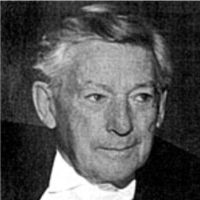
Thomas C. Wakeling was born in Saskatoon on May 19, 1924. He joined the Royal Canadian Air Force in May 1943 and was discharged in 1945 with the rank of flying officer, having served in Canada as an elementary flying instructor. In 1946, he married Peggy Munro and they had three children: Thomas W. Wakeling, Q.C. (Audrey), Robbie M. Wakeling (Virginia), and Margaret E. Lockwood (Eric).
In 1949, Wakeling graduated with distinction from the Law College at the University of Saskatchewan. From 1949 to 1950, he articled in Lloydminster with V.U. Miner, Q.C. and practiced there with Miner from 1950 to 1957. Wakeling was called to the Saskatchewan Bar in 1950 and to the Alberta Bar in 1953. In 1957, he moved to Regina and practiced with the firm of MacPherson, Leslie & Tyerman until 1963 when he became a partner in the firm of McDougall, Ready and Wakeling. He was appointed Queen’s Counsel in 1971 and was appointed to the Court of Appeal in December of 1984.
Over the years, Wakeling took an active part in the leadership of the legal profession. He was provincial president of the Canadian Bar Association from 1970 to 1972, a bencher of the Law Society of Saskatchewan from 1973 to 1979 and president of the Law Society of Saskatchewan from 1978 to 1979. Wakeling was also active in community service, often taking on a leadership role. He served as the president of the Regina Kiwanis Club, Lieutenant Governor of the Western Division of Kiwanis International, president of the Saskatchewan Division of the Canadian Red Cross, president of the Regina YMCA, and president of the Wascana Country Club. He served as the Chairman of the Saskatchewan Police Commission from 1975 to 1984.
Wakeling retired from the Bench on May 19, 1999. He became involved in a number of mediations and he served as the Chair of the Arbitration Board to establish a wage scale for the Regina City Police. He passed away in Regina on November 19, 2005.
The Honourable Darla Catherine Hunter
1990 – 2007 Justice of the Saskatchewan Court of Queen’s Bench
2007 – 2010 Justice of the Saskatchewan Court of Appeal
Darla Hunter was born in Regina, and grew up on a farm outside of Fillmore, Saskatchewan. She received a Bachelor of Laws in 1977, a Bachelor of Arts (with distinction) in 1972 from the University of Saskatchewan and a Teaching Certificate in 1967 from Regina Teachers College.
Upon her admission to the Bar of Saskatchewan in 1978, she became the Director of the Queen’s Bench Rules Revision Project and a lecturer at the College of Law, University of Saskatchewan. As a lawyer, she was a Member of the Board of Inquiry for the Rafferty-Alameda Dam Project and a Member of the Supreme Court of Canada Liaison Committee for the Canadian Bar Association. From 1981 until her appointment to the Court of Queen’s Bench in 1990, she practiced with the law firm of MacPherson, Leslie and Tyerman in the Regina office litigation department.
Hunter was elevated to the Court of Appeal in 2007 and retired in 2010. The Honourable Darla Hunter is married with two daughters.
The Honourable Gene Anne Smith
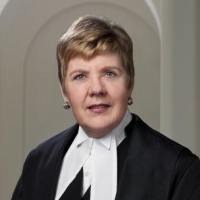
2005 – 2012 Justice of the Saskatchewan Court of Appeal
Gene Anne Smith was born in Arkadelphia, Arkansas, USA in 1941. She attended Mary Baldwin College in Staunton, Virginia and was awarded her Bachelor of Arts in 1963. The following four years she did graduate study in philosophy at Duke University in Durham, North Carolina, completing all but her dissertation for her Ph.D. She worked as an Assistant Professor of Philosophy at the University of Saskatchewan from 1967 to 1970 at which time she was accepted into law school at the University of Saskatchewan.
She graduated with her LL.B. in 1974 winning the gold medal award. She articled and then worked as an associate at McKercher, McKercher, Stack, Korchin and Laing until 1979 when she accepted a position with the College of Law at the University of Saskatchewan. She taught law for 18 years until her appointment to the Court of Queen’s Bench in 1997. She was elevated to the Court of Appeal in 2005 and retired from the judiciary in 2012.
She now makes her home in Niagara-on-the-Lake with her daughter, Sarah, and her grandson, Ryder.
The Honourable Marjorie Gerwing
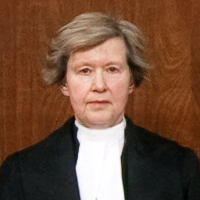
Marjorie Anne Gerwing was born in Humboldt, Saskatchewan in 1943. She grew up in the village of Lake Lenore, where she received her early education from the Ursuline Sisters. She obtained her Bachelor of Arts with distinction in 1964 and her Bachelor of Laws in 1967 from the University of Saskatchewan. She articled with David Tyerman of MacPherson, Leslie & Tyerman and was admitted to the bar in 1968.
She practiced with MacPherson Leslie & Tyerman from 1968 until her appointment to the bench in 1984 when she became the first woman to be appointed to the Saskatchewan Court of Appeal.
Gerwing retired on January 31, 2013.
The Honourable Ysanne G. K. Wilkinson
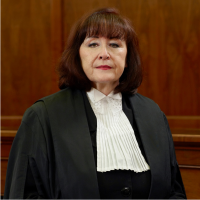
2007 – 2009 Justice of the Court of Appeal for Saskatchewan
2009 – 2021 Justice of the Court of Queen’s Bench for Saskatchewan
Ysanne Wilkinson was born in Singapore in 1953. She graduated high school in Prince Albert, and went on to earn a Bachelor of Laws from the University of Saskatchewan in 1977.
Admitted to the Bar in 1978, she joined what was then the James H.W. Sanderson Law Office, and became partner at Sanderson & Wilkinson in 1981. She was a member of the Provincial Planning Appeals Board from 1987 to 1990, and a member of the Local Appeal Committee for the Saskatchewan Assistance Plan from 1987 to 1989. She was appointed Queen’s Counsel in 1991.
In 1996, Wilkinson was appointed a judge of the Court of Queen’s Bench for Saskatchewan. She was elevated to the Court of Appeal in 2007. After two years on the Court of Appeal, Wilkinson returned to the Court of Queen’s Bench, where she sat as a judge in that Court’s Family Law Division until her retirement in 2021.
The Honourable Maurice Herauf
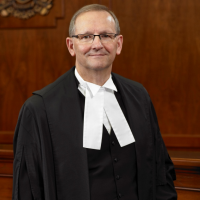
2011 – 2018 Justice of the Court of Appeal for Saskatchewan
Maurice Herauf was born in 1952 in Regina and was raised on a farm near Odessa. He entered the employment of the provincial Attorney General’s department in 1971. He served as Deputy Sheriff and Deputy Registrar in Battleford for the Court of Queen’s Bench from 1975 to 1978, when he became Registrar of the Unified Family Court in Saskatoon, where he remained from 1979 to 1982.
He then attended the University of Saskatchewan and received his Bachelor of Laws in 1986. He articled at the law firm of Mitchell, Taylor, Romanow and Ching. He was admitted to the Bar of Saskatchewan in 1987.
Herauf worked for the Government of Saskatchewan for 20 years in a number of positions including Director of the Maintenance Enforcement Office, Manager of the Licence Administration Branch of the Saskatchewan Liquor and Gaming Authority, and Registrar of the Court of Appeal and Registrar in Bankruptcy. He was appointed Queen’s Counsel in 2001.
In 2007, he was appointed to the Court of Queen’s Bench for Saskatchewan at the Judicial Centre of Swift Current. In 2009, he was reassigned to the Judicial Centre of Moose Jaw. In 2011, he was appointed to the Court of Appeal for Saskatchewan. He served in that position for seven and one-half years before retiring in 2018.
The Honourable Jacelyn A. Ryan-Froslie
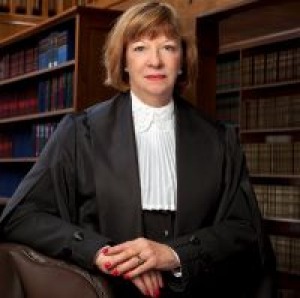
2013 – 2022 Justice of the Court of Appeal for Saskatchewan
Jacelyn A. Ryan-Froslie was born in Saskatoon and raised on a farm near Fielding, Saskatchewan. She attended school in Fielding and in the neighbouring communities of Radisson and Maymont, graduating from Grade 12 in 1972. She then attended the University of Saskatchewan where she earned a Bachelor of Arts in Political Science with distinction (1975) and a Bachelor of Laws (1977).
Ryan-Froslie was admitted to the Bar in 1978, and went on to practice primarily civil litigation and family law with Anderson & Company in the city of Swift Current, eventually becoming a partner. She served as the vice-chair of the Saskatchewan Police Commission, was a local governor of the Saskatchewan Trial Lawyers’ Association, and served as an instructor at the Bar Admission Course. In 1999, she received her Queen’s Counsel designation.
She was appointed to the Court of Queen’s Bench (Family Law Division) in 2000 and became a Deputy Judge of the Supreme Court of Yukon in 2009. In 2013, she was appointed to the Court of Appeal for Saskatchewan. She retired in 2022.
The Honourable Brian Barrington-Foote
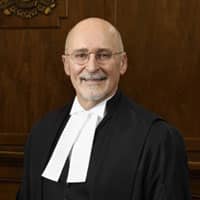
2018 – 2024 Justice of the Court of Appeal for Saskatchewan
Brian Barrington-Foote was born and raised in Vancouver. He holds a B.A. in history from Simon Fraser University (1973) and an LL.B. from the University of British Columbia (1977). He was admitted to the British Columbia Bar in 1978, the Saskatchewan Bar in 1985, and the Alberta Bar in 1992.
Mr. Barrington-Foote practiced law as a partner with law firms in Victoria, Calgary and Regina, including McKercher McKercher & Whitmore from 1995 to 2002 and MLT LLP from 2002 until his appointment to the Court of Queen’s Bench in 2012. His private practice included litigation and advising for private and public clients in civil, commercial and public law, including as counsel for First Nations. He also worked as a Crown Solicitor in the Constitutional and Administrative Law Branch in the British Columbia Ministry of the Attorney General, as Coordinator of Constitutional Relations and A/Executive Director of Civil Law in the Saskatchewan Ministry of Justice, and, from 1987 to 1992, as Deputy Minister of Justice and Deputy Attorney General for Saskatchewan.
Mr. Barrington-Foote was appointed Queen’s Counsel in 1988. He was a member of various non-profit and public boards and committees in the legal and broader community as a lawyer and as a judge, including the Law Foundation for Saskatchewan and from 2015 to 2022, as Chair of the Judicial Advisory Committee for Saskatchewan. Mr. Barrington-Foote was appointed to the Court of Queen’s Bench in 2012 and to the Court of Appeal in 2018, where he served until his retirement in 2024.
The Honourable Edward L. Elwood
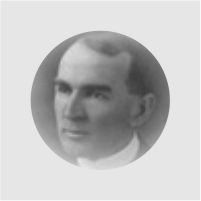
Edward Elwood served on the Court of Appeal from March 2, 1918, through to May 19, 1921. Elwood was from Moosomin. He was a well-known lawyer in the province and was the first elected president of the Law Society of Saskatchewan.
The Honourable James McKay
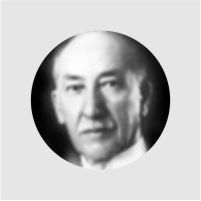
1918 – 1921 Justice of the Saskatchewan Court of King’s Bench
1921 – 1932 Justice of the Saskatchewan Court of Appeal
James McKay was born on July 12, 1862, in Manitoba to parents William McKay, a Chief Factor with the Hudson’s Bay Company, and Mary Cook. His pioneering family came to Canada in the early 1700s, and his ethnic origins were Highland Scottish and Native Canadian.
McKay attended the University of Manitoba and graduated with a Bachelor of Arts with Honours in Classics. He went on to article with a law firm in Winnipeg. He temporarily left his articles to serve as a soldier during the Riel Resistance of 1885. He was involved in battles at Fish Creek and Batoche. At one point, he organized 50 volunteers who surrounded Almighty Voice until Royal Canadian Mounted Police arrived on the scene.
McKay was called to the Manitoba bar in 1886. He practiced for one year in Winnipeg before relocating to Prince Albert. There, he became the first Territorial lawyer to receive a Queen’s Counsel designation. In 1896, he ran as a Conservative in the general election against Wilfred Laurier, losing by only a few votes. In 1911, McKay ran again and won the Prince Albert constituency. He was popular and respected and had additional political clout in rural areas due to his Aboriginal ancestry.
In 1914, McKay was appointed to the Supreme Court of Saskatchewan. When the court restructured in 1918, he became a member of the Court of King’s Bench. In 1921, he was appointed to the Court of Appeal. McKay was also a member of the Board of Governors of the University of Saskatchewan.
McKay was the first judge of Aboriginal ancestry to be appointed to the Court.
The Honourable Percival H. Gordon

Percival H. Gordon was born in Qu’Appelle on January 27, 1884, one year after his family emigrated from Scotland. The young Gordon worked at an early age to ease the financial burden on the family caused by the death of his father, who had been a lawyer in Regina. At 15, Gordon’s right arm was amputated due to a shotgun accident at Qu’Appelle. Despite this handicap, he became an outstanding athlete at school and university, excelling in high jump, discus and running.
Gordon was educated at Trinity College in Port Hope, Ontario. He graduated with a Bachelor of Arts degree from the University of Toronto in 1905 and his Masters degree in 1906.
Gordon immediately moved back to Regina and articled with his older brother, A.L. Gordon. He was called to the Saskatchewan bar in 1908. That same year, he married Hattie S. Kennedy of Dixie, Ontario. The Gordon brothers had a successful practice. In 1922, the elder Gordon retired and by 1928, Percival Gordon was the head of a legal staff of 50. He worked primarily for the C.P.R., insurance companies and farm implement dealers. In 1930-31, he represented the federal government on the Saskatchewan Relief Commission. In 1933-34, he represented Saskatchewan before the Dysart Commission on natural resources. In 1934, he was admitted to the bar in Ontario and practiced in Toronto for 18 months before returning to Regina.
From 1921-1942, Gordon served as chancellor of the Anglican diocese of Qu’Appelle. He was the wartime leader of the Canadian Red Cross and in 1941-1944, he chaired the national executive.
Gordon was appointed to the Court of Appeal in 1935. He retired from the Court in March of 1961, returning to the practice of law as associate counsel for the firm of Embury, Molisky, Gritzfeld and Embury in Regina. Upon his return to practice, Gordon represented doctors who sought to have the 1962 Medicare legislation declared invalid. Chief Justice Martin stated that Gordon was the greatest authority on Court of Appeal practice in his era. Gordon died in April 1975.
The Honourable Hector Y. MacDonald
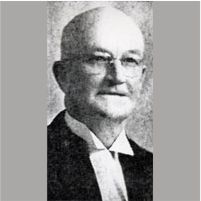
1941 – 1951 Justice of the Saskatchewan Court of Appeal
Hector Y. MacDonald was of Highland Scottish ancestry, born in Cape Breton, Nova Scotia and went to law school at Dalhousie University. He practiced law in Halifax and Sydney before moving West.
From 1906 to 1908, he practiced law in Moosomin and Prince Albert before moving to Regina in 1908 to work for the Attorney General’s Department. In 1910, he became Regina’s first City Solicitor. Six months later he joined a private law firm, working with the Gordon brothers (one of whom, P. H. Gordon, would become a judge of the Court of Appeal). MacDonald was famous for his sense of humor.
MacDonald was appointed to the Court of King’s Bench in 1918 and to the Court of Appeal in 1941. He served on the Court until February 1951. He died in 1969.
Photo courtesy of the Regina Leader Post and the Saskatchewan Archives Board (R-A25016).
The Honourable Arthur Thomas Procter
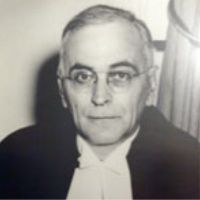
Arthur Thomas Procter was born in 1886 in Oswald, Manitoba. He was educated at St. John’s College in Winnipeg and later attended the University of Manitoba. He obtained his law degree in 1910.
Procter was called to the Saskatchewan bar in Moosomin in 1911. He worked as a Crown prosecutor in Moosomin from 1914-1915. In 1915, he enlisted as a private in the army. He served in France and three years later was discharged as a lieutenant. Procter suffered injuries during the war that left him with permanent physical disabilities. After the war he met Marjory Perly-Martin, who worked at a soldier’s hospital. They were married in 1918. Procter returned to Moosomin in 1918 and resumed his law practice.
In 1926, Procter was named King’s Counsel. During 1928-1929, he was the assistant counsel for the Royal Grain Commission. In 1929, he ran and lost in the provincial election as a Liberal in the Moosomin constituency. In 1934, he ran again and won the election. He served as the Minister of Highways from 1938-1944. During 1944-1948, Procter was one of a five-person opposition in the Legislature.
Procter was appointed to the Court of Appeal in 1948. He retired from the Court of Appeal in March 1961, when a Constitutional amendment made it mandatory for judges to retire at the age of 75. He died in 1964 after battling a lengthy illness. Procter was famous for his skills as a public speaker and his quick wit. After his death, Chief Justice Culliton said that “he was a man of unimpeachable character and integrity” and had “a constant desire to prevent injustice where it might occur and correct it where it did”.
The Honourable Percy H. Maguire
1962 – 1974 Justice of the Saskatchewan Court of Appeal
Percy H. Maguire was born in Elgin, Manitoba, on October 14, 1899. His family moved to Saskatchewan in 1910, and he attended high school in Saskatoon. In 1918 he enlisted in the Royal Air Force and then entered the University of Saskatchewan, graduating with a Bachelor of Arts degree in 1921 and a law degree in 1924. Maguire was admitted to the Bar in 1924 and spent the following year studying as a special student at Harvard Law School.
From 1925 to 1936, he practiced in partnership with Carroll, Sheppard & Maguire. In 1936, he and Emmett Hall formed their own law firm in Saskatoon. In 1937, Maguire was appointed King’s Council. He practiced law in Saskatoon until he was appointed to the Court of Appeal in 1962.
During the Second World War, he served for a time as acting City Solicitor. He also served for four years in Ottawa in the Judge Advocate-General’s office for the Canadian Army. Maguire was discharged in 1946 with the rank of Major.
During his years in Saskatoon, Maguire was active in civic affairs and was a member of many service clubs. He served as vice-president of the Saskatchewan chapter of the Canadian Bar Association in 1959 and 1960, and served as the president of the Saskatoon Bar Association. He was also one of the first directors of the Saskatoon Hilltops.
Maguire served on the Court of Appeal until his retirement in 1974. He passed away on November 19, 1984.
The Honourable Russell Brownridge
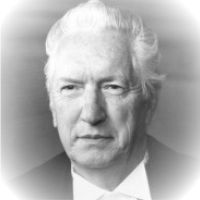
1961 – 1988 Justice of the Saskatchewan Court of Appeal
Russell Brownridge was born in Saskatoon on November 23, 1914, the second of six sons. His father Alvin was a CPR man. The family moved to Moose Jaw in 1919, where he attended public school. Upon his graduation, he took a one-year commercial course at the Moose Jaw Technical School, which enabled him to work as a stenographer-bookkeeper and earn enough money to attend university. He attended the University of Saskatchewan and worked in the law library during the summers. He was an active participant in student affairs, such as debating and dramatics. He enjoyed politics and worked on John Diefenbaker’s unsuccessful 1938 campaign.
Brownridge obtained a Bachelor of Arts with Distinction in 1937 and graduated from the College of Law in 1939. He articled for John Diefenbaker until Diefenbaker was elected to the House of Commons in 1940. He completed his articles under William Ross of Moose Jaw. In 1942, he married Mary E. Roycroft. The couple had two sons, Robert and James.
Brownridge practiced law in Moose Jaw with Tom Schollie. He was involved in politics, running unsuccessfully as a Conservative in the 1944 provincial election. Brownridge was a Moose Jaw alderman for five years, and he ran unsuccessfully for mayor.
Brownridge was appointed to the Court of Queen’s Bench in 1959 and to the Court of Appeal in 1961. He served the appellate court until 1988.
Brownridge was active in the community. He was a member of the Kiwanis Club for 41 years, and served as the Club’s Lieutenant Governor. He was on the board of directors of the Moose Jaw Union Hospital, the YMCA, the United Way and the public library. He was the president of the Saskatchewan division of the Red Cross and was the first person from Saskatchewan elected as the national president of the Canadian Red Cross Society. He was chairman of the Canadian Council of Christians and Jews. While in Regina, Brownridge and his wife, Mary, were avid supporters of the arts community, and he served on the board of the Regina Symphony Orchestra.
The Court of Appeal Judges and staff were fortunate each Christmas season to be entertained by Brownridge’s jokes and historic stories, including the year he turned 90 years of age. He died in Regina on November 3, 2005.
The Honourable Raymond A. MacDonald
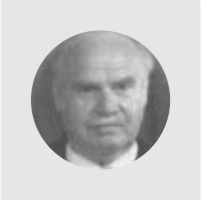
1981 – 1984 Justice of the Saskatchewan Court of Appeal
Raymond MacDonald was originally from Saskatoon. In 1938, he graduated from the College of Law at the University of Saskatchewan. He moved to Regina in 1939 and practiced law with John A. Fraser, Q.C. Like so many of his generation, he answered the call of his country and enlisted in the Canadian Army where he served overseas.
After the war he returned to Regina to practice law. He was respected by his professional colleagues and enjoyed the confidence of his many clients. He found time for family, as well as civic and professional affairs. In 1964 he was appointed Queen’s Counsel.
In 1965, he was appointed as a Judge of the Court of Queen’s Bench, serving in that capacity until 1981 when he was appointed to the Court of Appeal. He served on the Court until his retirement in November of 1984.
After his retirement, he was actively involved in civic affairs. He served as a member and Chairman of the Board of Santa Maria Senior Citizens Home and was the first Chairman of the Board of Regents of Campion College.
When MacDonald died in November of 1991, his friend and colleague Justice C.F. Tallis of the Court of Appeal gave the eulogy at his funeral. Tallis said that MacDonald’s life was “marked by loving kindness, a spirit of compassion and charity that pervaded all his relationships.” He went on to say, “As a lawyer I had the privilege of appearing before Ray MacDonald as a Judge of the Court of Queen’s Bench. Beneath his quiet and controlled public reserve lay an instinctive passion for justice and fair play. […] As an appellate judge he left his mark. For me his quiet dignity at the conference table was marked with a sense of fairness and justice in approaching issues. His influence and conduct will be a legacy and guide for the Court.”
The Honourable Calvin F. Tallis
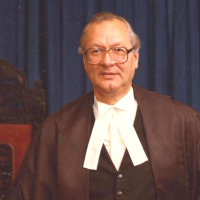
1976 – 1981 Justice of the Supreme Courts of the Northwest Territories and the Yukon Territory; 1981 – 2005 Deputy Judge of the Supreme Courts of the North West Territories and Yukon Territory
1976 – 1981 Justice of the Appeal Court of the Yukon Territory
1981 – 2005 Justice of the Saskatchewan Court of Appeal
1999 – 2005 Justice of the Appeal Court of Nunavut and Deputy Judge of the Nunavut Court of Justice
Calvin Tallis was born near Borden, Saskatchewan, in 1930. He attended elementary school at the Rural School of Halcyonia. He took his high school training through correspondence until the last half of Grade 12 when he attended school in Borden. He took teacher training and taught in rural schools for two years (1947-48 and 1948-49). He then went on to study at the University of Saskatchewan.
In 1952, he graduated with an Arts and Science Degree, and in 1954 he earned a Law degree. In 1955 he married Dorothy Irene Poppl from Daylesford, Saskatchewan.
Tallis was admitted to the Saskatchewan bar in 1955 and the British Columbia bar in 1973. He was licensed to practice law in the North West Territories in 1975.
Tallis was a partner in the law firm of Goldenberg, Taylor and Tallis in Saskatoon prior to his appointment to the Supreme Courts and Appeal Courts of the North West Territories and Yukon Territory in 1976. He ceased being a justice of the Supreme Courts in 1981 when he accepted an appointment to the Saskatchewan Court of Appeal, but continued as Deputy Judge of the two Supreme Courts until his retirement from all Courts on his 75th birthday in 2005. He passed away in Regina on October 14, 2021.
The Honourable Nicholas W. Sherstobitoff
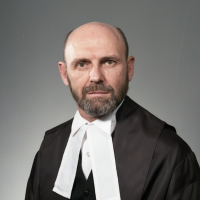
Nicholas Sherstobitoff was born near Langham, Saskatchewan, in 1935. He attended elementary and high school in Saskatoon. In 1956, he graduated with a B.A. magna cum laude from the University of Saskatchewan, and in 1958, he obtained his Law degree cum laude from the same university. He was admitted to the bar in 1960.
From 1960 through to 1985, . Sherstobitoff practiced law in Saskatoon. His areas of practice were civil litigation, labour law and administrative law. From 1974-1979, he served as a member of the Saskatchewan Community Legal Services Commission, and from 1977-1982, he served as the Chairman of the Saskatchewan Labour Relations Board and the Chairman of the Saskatchewan Occupational Health and Safety Council. He also served as Chair on numerous consensual labour arbitration boards.
In 1985 he was appointed a judge of the Saskatchewan Court of Appeal. Sherstobitoff retired on September 28, 2010.
The Honourable William Vancise
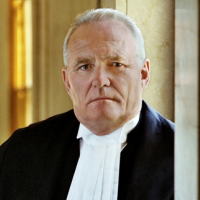
1983 – 2013 Justice of the Saskatchewan Court of Appeal
1996 – 2013 Justice of the Supreme Court of the Northwest Territories
William Vancise was born in Regina, Saskatchewan, in 1938. He attended elementary school in Regina and Grand Coulee, and enrolled in Regina’s Luther College for high school. He received a Bachelor of Arts from the University of Saskatchewan in 1958, and two years later, obtained his Law degree from the same university.
Admitted to the Bar in 1961, he joined Balfour & Balfour as an associate in 1961. The following year, he joined Balfour, McLeod, McDonald, Laskchuk and Kyle. Vancise became a partner with that firm in 1963 and a managing partner in 1972. He specialized in resource, administrative and labour law, and was appointed Queen’s Counsel in 1979.
In 1982, Vancise was appointed a judge of the Saskatchewan Court of Queen’s Bench. He was elevated to the Court of Appeal a year later. While sitting as a justice of the Court of Appeal, he was the founder and first president of the National Judicial Counselling Programme, a professional counselling service for federally appointed judges and their families. He was also appointed Chairman of the Copyright Board of Canada in 2004.
Vancise retired in January 2013.
The Honourable Stuart John Cameron
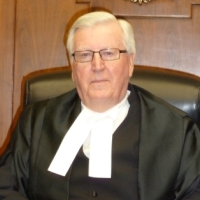
1981 – 2014 Justice of the Saskatchewan Court of Appeal
Stuart Cameron was born in Maple Creek in 1939 to Alexander and Miriam Cameron. He attended high school at Campion Collegiate in Regina and got his Bachelor of Arts in 1961 and his LL.B. in 1962 from the University of Saskatchewan. He married Sonia Patzsernuik in 1962 and they had three children, Alison, Sheila and Sandi.
He articled to E.J. Moss, Q.C. in 1962 and was admitted to the Saskatchewan Bar in 1963. He became a partner of Moss, Wimmer and Cameron in 1964 and then later merged with the firm of Balfour Moss. He was appointed Chief of Staff to the Federal Minister of Justice in 1973 and elected to the Saskatchewan Legislature in 1975.
. Cameron sat on a number of boards including the Board of Governors of the Regina General Hospital, the Saskatchewan Board of Directors for the John Howard Society, chair of the Regina Housing Authority and President of the Regina Bar Association.
He was appointed to the Court of Queen’s Bench in 1980 and then to the Court of Appeal in 1981.
Cameron served as vice-president of the Canadian Institute for the Administration of Justice and was a faculty member for many years of the Saskatchewan Bar Administration Course. He retired from the Court of Appeal on his 75th birthday, May 15, 2014.
The Honourable J. Gary Lane
1991 – 2017 Justice of the Court of Appeal for Saskatchewan
Gary Lane was born and raised in Saskatoon. He earned an arts degree from the University of Saskatchewan in 1963, and an LL.B from the same institution three years later.
After being admitted to the Bar in 1967, he joined the provincial Department of the Attorney General as a Crown attorney, later becoming executive assistant to the Attorney General.
In 1971, he was elected to the Saskatchewan Legislative Assembly. He continued to serve as an MLA for 20 years, holding various Cabinet roles, including that of Saskatchewan’s first Minister of Justice. In 1976, he founded the law firm of Lane and Whitmore with partner Peter Whitmore.
Lane was appointed to the Court of Appeal for Saskatchewan in 1991. He was active in judicial matters including the Canadian Superior Court Judges Association and the Court Technology Committee of the Canadian Judicial Council.
Lane retired from the Court of Appeal in May 2017.
The Honourable Ralph K. Ottenbreit
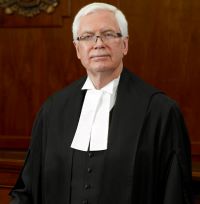
2009 – 2022 Justice of the Court of Appeal for Saskatchewan
Ralph Ottenbreit was born in Ludwigshafen, Germany, and immigrated to Canada with his parents and two brothers when he was four years old. He grew up in east Regina in a multicultural neighbourhood and attended St. Augustine School and Miller High School. He speaks English and German.
Following high school, Ottenbreit attended the University of Saskatchewan where he earned a B.A. with distinction in 1974 and an LL.B. with distinction in 1975. He articled and practiced with Griffin Beke and Thorson. In 1982, he joined Shirkey Ulmer Shirkey and Ottenbreit. Ottenbreit received a Queen’s Counsel designation in 1989.
In 1991, Ottenbreit joined Robertson Stromberg. He practiced in the areas of criminal and civil litigation and was active in the legal community, serving a term as president of the Canadian Bar Association, Saskatchewan Branch. He was a partner at the time of his appointment to the Court of Queen’s Bench in 2007.
Two years later, he was appointed to the Court of Appeal for Saskatchewan, where he served from 2009 until his retirement in 2022.
The Honourable Peter A. Whitmore
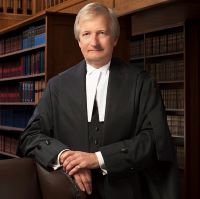
2013 – 2022 Justice of the Court of Appeal for Saskatchewan
Peter Whitmore was born and raised in Regina. He attended McGill University, graduating with a Bachelor of Commerce in 1971. He then attended the University of Saskatchewan where he earned an LL.B.
He articled with the firm of Balfour Moss Laschuk Kyle Vancise & Cameron and practiced law in Regina for two years before joining Gary Lane to form Lane & Whitmore Law Offices, which became Whitmore and Company. In 1989 that firm merged with McKercher, McKercher, Stack Korchin and Laing to form what would become McKercher, McKercher & Whitmore. Whitmore received the designation of Queen’s Counsel in 1986.
He served on a number of boards in Saskatchewan, including acting as Vice-Chancellor and Chancellor of the Diocese of Qu’Appelle from 1983 to 2014, and on the Board of Regents of Luther College, Regina for 12 years, acting as Chair of the Board of Regents for part of that time.
Whitmore received the degree of Doctor of Canon Law (honoris causes) from the University of Emmanuel College in 2004. He was appointed to the Court of Queen’s Bench in 2008 and the Court of Appeal for Saskatchewan in 2013. He retired from the Court of Appeal in 2022.

